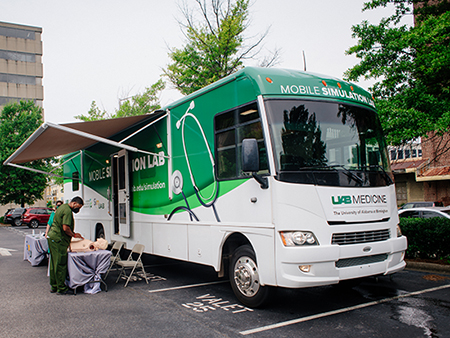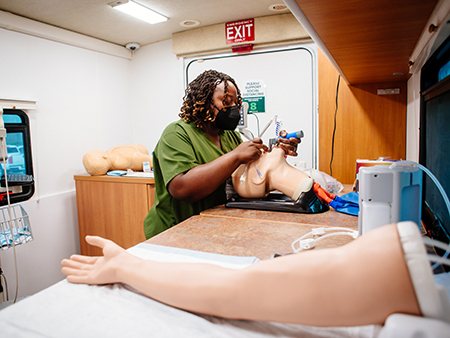 Simulation training is proving to be very valuable in health care, especially for smaller facilities.
Simulation training is proving to be very valuable in health care, especially for smaller facilities.
(Photography: Steve Wood)It might look like a typical 38-foot recreational vehicle on the outside, but the inside paints a different picture. This is a sophisticated medical training tool. The Alabama Rural Health Collaborative and SimUAB® Mobile Simulation Lab brings advanced simulation training directly to health care professionals around the state. It is a training and teaching tool available to hospitals and medical facilities affiliated with the UAB Health System.
A new joint project between the Alabama Rural Health Collaborative and SimUAB®, a component of UAB Clinical Simulation, the lab is the only mobile simulation unit in Alabama.
“Simulation training is a growing practice, which allows health care professionals at all levels to improve their skills and demonstrate their knowledge base without risk to patients,” said April Belle, DNP, senior simulation coordinator. “UAB’s Clinical Simulation program is an accredited simulation program with a record of partnering with content experts to help implement best practices in health care. And now we can take our training program on the road.”
The retro-fitted vehicle, from Farber Specialty Vehicles, comes with an overall price tag of $333,000. It offers a high-fidelity manikin that mimics a human patient. The manikin breathes, has a pulse and can even blink. It presents measurable vital signs and responds as a real patient would.
The lab has two distinct work spaces inside the vehicle, and the manikin and other equipment are portable, so they can be set up in a parking lot or training area within a health care facility. There is audio and video capability to monitor and record the training sessions.
The training sessions will be personalized to work with individuals, care teams or entire health care systems. The sessions can be targeted to any number of specific medical issues, including sepsis management, Foley catheter insertion, central venous line insertion as well as skills in airway management or ultrasound procedures.
“In simulation training, the learners care for the manikin as they would a real patient in a real situation,” said Belle. “Teams respond as they would normally and do everything for their patient including administering medications and practicing communication.”
Belle says the training improves individual skills and team interactions and can also help to provide a systems test of a health care facilities overall procedures.
 (Photography: Steve Wood)“A mobile simulation program allows health care learners to develop skills, hone critical thinking and improve confidence in a low stress, no risk environment,” said Marjorie Lee White, M.D., vice president for UAB Clinical Simulation. “Simulation is becoming essential for individuals, teams and health care systems to develop and maintain a positive impact on patient care delivery and outcomes. We are looking forward to partnering with experts in rural health care delivery to design and deploy simulations that will meet their critical training needs.”
(Photography: Steve Wood)“A mobile simulation program allows health care learners to develop skills, hone critical thinking and improve confidence in a low stress, no risk environment,” said Marjorie Lee White, M.D., vice president for UAB Clinical Simulation. “Simulation is becoming essential for individuals, teams and health care systems to develop and maintain a positive impact on patient care delivery and outcomes. We are looking forward to partnering with experts in rural health care delivery to design and deploy simulations that will meet their critical training needs.”
The Alabama Rural Health Collaborative was created to provide assistance for non-profit rural hospitals across the state.
“Currently, we are working with rural hospitals on revenue cycle, price transparency, administrative internship/fellowship programs, grants and strategic planning,” said Dawson Smith, director of the ARHC. “Mobile clinical simulation is one more program that we can deploy to support those hospitals as they work to improve the quality of care for their patients.”
For the time being, the mobile lab is available for use by the nine hospitals that are affiliated with the Alabama Rural Health Collaborative. There is no cost to the institution for the training other than the in-kind contribution of local health care teams.
SimUAB® is an internationally accredited simulation program with a diverse team including educators, specialists and administrators with expertise in facilitator development and procedural, immersive and systems-based simulation. In a typical year, the team facilitates more than 25,000 learner hours of simulation.
For more information on the Mobile Simulation Lab, contact